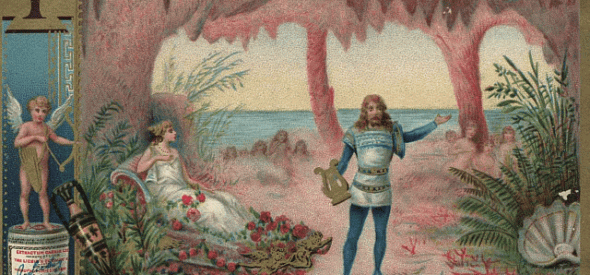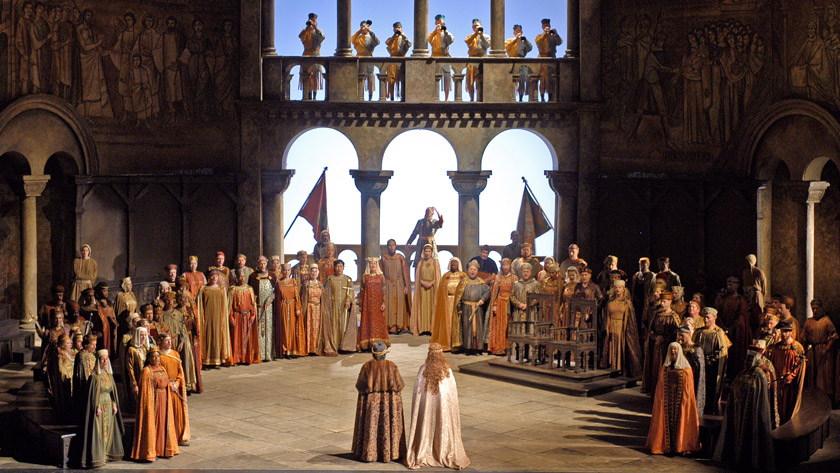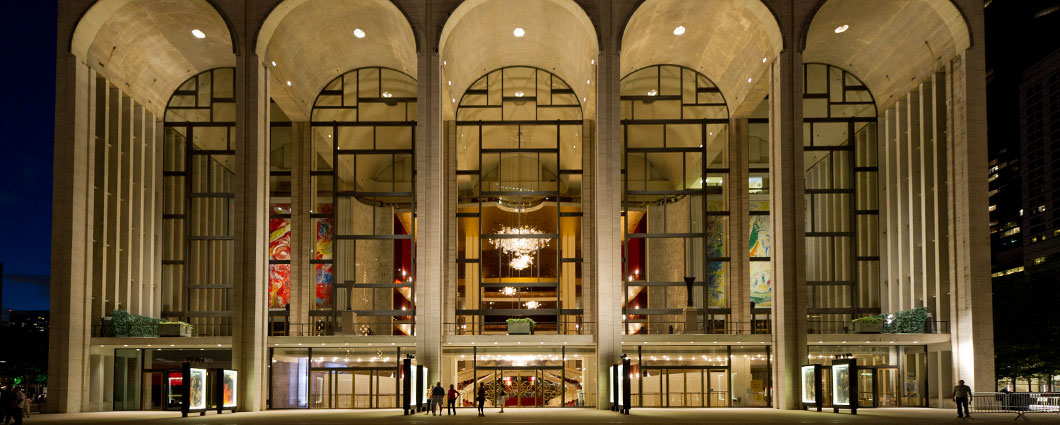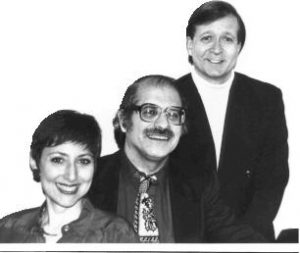Why the Met Tannhäuser Teared Me Up by Leonard Lehrman
Comments Off on Why the Met Tannhäuser Teared Me Up by Leonard LehrmanJuly 30, 2020 by Admin

“My eyes fill with tears,” sings Mattathias in my opera Hannah (see http://ljlehrman.artists-in-residence.com/Hannah.html), as they do now, partly because I’m recovering from cataract surgeries, scheduled April 16 & 21, which finally took place July 16 & 21, but partly from watching the free broadcast this week of the 1983 revival of the Metropolitan Opera’s Fall 1977 production of Richard Wagner’s Tannhäuser, in which as Assistant Chorus Master, backstage conductor, and (for one rehearsal) prompter, I had a small but not insignificant part. So this article will be part review and part memoir.

My own personal connection to Tannhäuser began long before and continued long after my work at the Met. When I was 16, the Wagnerian opera singer Leta Schoelles, scion of the Schoelles Pharmacy dynasty in Sea Cliff, engaged me as her private accompanist to sing – mostly for her mother, but occasionally in public – the repertoire of Kirsten Flagstad, including Verdi, Strauss, but mostly Wagner, and of course Elisabeth’s arias in Acts 2 & 3 of Tannhäuser. I learned to stretch tempi in expressive passages, and to push ahead when the breath seemed to be running out! I also taped a recording played over WQXR, directed by Wieland Wagner (for years I thought it had been conducted by him, but no, I was assured by colleagues: Wieland never conducted anything “except maybe in the bathtub” – the actual conductor was the sturdy, dependable Wolfgang Sawallisch), and fell in love with portions of it sung by Wolfram and the title role: not so much the famous Act III Evening Star Ode as the Act I Finale and the Hymn to Venus, sung 3 times in Act I and reprised in both the later acts. Since I did not know German then, I bought a second-hand score of the work at Patelson’s – in French! I also enjoyed singing the Act II Chorus with the NY All State Chorus at the Concord Hotel under John Motley – as “Hail, Bright Abode!” – in English!
German came later when, during the student strikes at Harvard, I began studying Bertolt Brecht, and a friend told me: “If you knew German, you’d be dangerous!” So I learned it – in a summer course at Queensborough Community College and from German students in exchange for English lessons at the Cité Universitaire in Paris, where I had been awarded a French Government Grant to study with Nadia Boulanger for a year.
Meanwhile, the Hymn to Venus echoed wordlessly through my brain – fortunately, as it turned out. During an Advanced Calculus exam I found myself humming the scherzo theme from Schumann’s Fourth Symphony for some reason, over and over, unable to stop or to concentrate. Only by summoning the Wagner theme, which ends with a definite cadence on the words “Lass mich ziehn!” (“Let me go!”) could I finally free my mind to solve the math problems in front of me.
As for Wolfram’s music at the end of Act I, beginning with “Wär’s Zauber, wär es reine Macht” and reprised with “O kehr zurück,” in which he acknowledges the magical power of his friend and rival’s artistry and pleads for him to return to the fold, I thought then, and still think, now, that this is the most beautiful music Wagner ever wrote. Hearing Bernd Weikl sing it this week, as he did in the 1977 production, didn’t just make me cry; it made me sob.

For Tannhäuser, inspired by Heinrich Heine, is a parable, like Die Meistersinger, of youthful exuberance getting carried away, being rejected by the establishment, and then finally finding acceptance. In the later work, which ends happily, the hero’s older mentor, Hans Sachs, is his savior. In the earlier work, the mutual love between the hero and the virginal Elizabeth leads to death for both of them – like Romeo & Juliet or Tristan & Isolde. But the striving for passionate expression and the hope for redemption is a common theme in nearly every Wagner opera. The Grail Music in Act III of Tannhäuser anticipates hours of embellishment in Parsifal.
 The 1977 Met production was the first Wagner essayed by “the two Jimmys”: conductor Jimmy Levine, who also conducted the 1983 revival; and tenor Jimmy McCracken, who had started off in the Met Chorus, gone abroad to advance his solo career, and was returning to the house as a local boy made good. The positive vibes were enormous, as everyone onstage, especially the Chorus, was rooting for him every second. Next to Tristan, the music is probably the most taxing of any of the Wagner roles, and it was not easy for McCracken, who often had to resort to mixed voice, or even falsetto, especially in rehearsal, but sometimes in performances too. Richard Cassilly, in the revival, had fewer vocal difficulties with the role, but was less uninhibited in the nasal imitation of the Papal Legate in the last act. As for Jimmy Levine, he had a way of conducting with an energy that seemed just a bit faster than expectations created by every other conductor’s rendition – in Rigoletto, in Otello, in Eugene Onegin, and especially in Tannhäuser. The Met prided itself in this production by doing the full, uncut, Paris version – with all the orgy ballet music – and without the Extra Chorus. The men of the main Chorus were stretched to their limits, but responded collegially and with tremendous spirit – as did the women, whose training & conducting was my job. But in Act I, I also got to sit backstage, hidden by the rocks, as Norbert Vesak’s superbly choreographed orgy swirled around me (extremely erotic, though always fully clothed) and with one hand I conducted the entering Pilgrims’ Chorus while the other hand played their notes for them (audibly for them, though not for the audience) on the harmonium, pumped by both my feet, keeping them on pitch. (No harmonium was used for them in Act III, and the pitch was a little less accurate.)
The 1977 Met production was the first Wagner essayed by “the two Jimmys”: conductor Jimmy Levine, who also conducted the 1983 revival; and tenor Jimmy McCracken, who had started off in the Met Chorus, gone abroad to advance his solo career, and was returning to the house as a local boy made good. The positive vibes were enormous, as everyone onstage, especially the Chorus, was rooting for him every second. Next to Tristan, the music is probably the most taxing of any of the Wagner roles, and it was not easy for McCracken, who often had to resort to mixed voice, or even falsetto, especially in rehearsal, but sometimes in performances too. Richard Cassilly, in the revival, had fewer vocal difficulties with the role, but was less uninhibited in the nasal imitation of the Papal Legate in the last act. As for Jimmy Levine, he had a way of conducting with an energy that seemed just a bit faster than expectations created by every other conductor’s rendition – in Rigoletto, in Otello, in Eugene Onegin, and especially in Tannhäuser. The Met prided itself in this production by doing the full, uncut, Paris version – with all the orgy ballet music – and without the Extra Chorus. The men of the main Chorus were stretched to their limits, but responded collegially and with tremendous spirit – as did the women, whose training & conducting was my job. But in Act I, I also got to sit backstage, hidden by the rocks, as Norbert Vesak’s superbly choreographed orgy swirled around me (extremely erotic, though always fully clothed) and with one hand I conducted the entering Pilgrims’ Chorus while the other hand played their notes for them (audibly for them, though not for the audience) on the harmonium, pumped by both my feet, keeping them on pitch. (No harmonium was used for them in Act III, and the pitch was a little less accurate.)
The production also marked the Met debut of soprano Kathleen Battle as the Shepherd, singing beautifully and exactly on pitch, unlike the boy who replaced her in 1983, alas. The English hornist both times was Richard Nass, who later soloed in the premiere of my setting of a poem by Afanasy Fet, “Greeting” with soprano Louise Wohlafka at Steinway March 11, 1979. (Helene Williams would record it in St. Petersburg in 2016.)

Two rehearsal moments I’ll remember forever, a low point and a high point. The low point was the first orchestral rehearsal of Act II, which concludes with an amazing contrapuntal section for all the men and Elisabeth, all the other women having fled the scene as the debate over the definition of love (pure vs. erotic) prompts the drawing of swords. That swirl of polyphony suddenly breaks off as the Chorus of Young Pilgrims, sung by the women offstage, suddenly emerges like a ray of light and hope. It was my job to bring them in, and trying to follow the score I became hopelessly lost, so the women did not come in. Levine threw down his baton in frustration and ended the rehearsal. (He had to. Union regulations allowed a rehearsal to continue into break time only if the music did not stop; and I had, inadvertently, stopped it.) Terribly repentant, I sought and found guidance from Chorus Master David Stivender, who showed me how to write down and count numbers from the last moment that individual voices were audible, through the section where virtually nothing but noise could be heard, in order to cue the entrance properly. I never failed to do it properly after that.
 The high point for me, though, was the first chorus staging rehearsal of Act II. Watching the scene this week, I recognized the bright, familiar faces of Midge Aldridge, Elizabeth Anguish, Linore Aronson, Glenn Bater, Wanda Cooke, Kent Cottam, Suzanne DerDerian, Elena Doria, Mary Fercana, Annie Florio, Nino Garcia, Connie Green, John Hanriot, Elinor Harper, Lorraine Keane, Herman Marcus, Bob Manno, Linda Mays, Fawayne Murphy, Joyce Olson, Domenico Simeone, Kun Yul Yoo, and so many others. The director was Otto Schenk (at right). What a character he was! He spent literally hours working with individuals and small groups of two, three, four, creating an ambience of friendly, seemingly casual, unregimented entry into the great hall by the nobles, showing how the choristers should comport themselves, with dignity and the consciousness that they were always on camera, so to speak. He also vividly demonstrated what they should not do – picking his nose, pulling on his ear, and even scratching his behind – cracking us all up. The rehearsal took place weeks before the premiere, so the production’s prompter, Philip Eisenberg, resident in San Francisco for most of the year, had not yet arrived. So who would sit in the prompter’s box? – the soloists wanted to know. I did! And got to give cues to John McCurdy (as Landgrave Hermann), Leonie Rysanek (as Elisabeth), Bernd Weikl, and Jimmy McCracken. It was such a thrill, particularly as each of them personally thanked me later for the (pretty) good job I’d done – at a moment’s notice.
The high point for me, though, was the first chorus staging rehearsal of Act II. Watching the scene this week, I recognized the bright, familiar faces of Midge Aldridge, Elizabeth Anguish, Linore Aronson, Glenn Bater, Wanda Cooke, Kent Cottam, Suzanne DerDerian, Elena Doria, Mary Fercana, Annie Florio, Nino Garcia, Connie Green, John Hanriot, Elinor Harper, Lorraine Keane, Herman Marcus, Bob Manno, Linda Mays, Fawayne Murphy, Joyce Olson, Domenico Simeone, Kun Yul Yoo, and so many others. The director was Otto Schenk (at right). What a character he was! He spent literally hours working with individuals and small groups of two, three, four, creating an ambience of friendly, seemingly casual, unregimented entry into the great hall by the nobles, showing how the choristers should comport themselves, with dignity and the consciousness that they were always on camera, so to speak. He also vividly demonstrated what they should not do – picking his nose, pulling on his ear, and even scratching his behind – cracking us all up. The rehearsal took place weeks before the premiere, so the production’s prompter, Philip Eisenberg, resident in San Francisco for most of the year, had not yet arrived. So who would sit in the prompter’s box? – the soloists wanted to know. I did! And got to give cues to John McCurdy (as Landgrave Hermann), Leonie Rysanek (as Elisabeth), Bernd Weikl, and Jimmy McCracken. It was such a thrill, particularly as each of them personally thanked me later for the (pretty) good job I’d done – at a moment’s notice.
Bernd Weikl was especially friendly. I remember at one performance, after an unusually harrowing Act II Finale, Jimmy McCracken began moaning aloud: “O am I in vocal trouble!” I approached Bernd, saying: “Do you think the understudy needs to be called in for Act III?” “Nah!” was his response. “This was the most difficult part. All he has to do in the third act is the Romerzählung, and he’ll get through that!” Which he did. With great drama and pathos, having, but needing to use, relatively little voice.
 Rysanek was also a great lady – I got to work with her a bit on Die Frau ohne Schatten (conducted by the venerable Karl Böhm, in the spring). Her 1983 replacement was Eva Marton, who was solid, and expressive, though a little on the stiff side. Grace Bumbry had been the vocally sumptuous Venus, replaced by the dynamic Tatyana Troyanos, whose Santuzza and Octavian I enjoyed in my year at the Met. One of the most amazing performers I’d ever seen, with every molecule vibrating in her at every moment on stage, whether she was singing or not (no wonder Leonard Bernstein chose her to portray Anita in his recording of West Side Story), I just wish the camera had captured her image during her final high note in Act III. She replied very graciously, though regretfully, in a letter I’ll treasure, responding to one I had sent her, asking if she’d consider performing the Mad Scene (https://youtu.be/SKnkww6BmCc) in my first full-length opera, Sima. (http://ljlehrman.artists-in-residence.com/Sima.html)
Rysanek was also a great lady – I got to work with her a bit on Die Frau ohne Schatten (conducted by the venerable Karl Böhm, in the spring). Her 1983 replacement was Eva Marton, who was solid, and expressive, though a little on the stiff side. Grace Bumbry had been the vocally sumptuous Venus, replaced by the dynamic Tatyana Troyanos, whose Santuzza and Octavian I enjoyed in my year at the Met. One of the most amazing performers I’d ever seen, with every molecule vibrating in her at every moment on stage, whether she was singing or not (no wonder Leonard Bernstein chose her to portray Anita in his recording of West Side Story), I just wish the camera had captured her image during her final high note in Act III. She replied very graciously, though regretfully, in a letter I’ll treasure, responding to one I had sent her, asking if she’d consider performing the Mad Scene (https://youtu.be/SKnkww6BmCc) in my first full-length opera, Sima. (http://ljlehrman.artists-in-residence.com/Sima.html)
Four years later, as Solorepetitor mit Dirigierverpflichtung at Stadttheater Bremerhaven, I was engaged privately to coach semi-retired tenor Karl Walter Böhm (no relation to Karl Böhm). The main role he wanted to brush up on was the lead in Eugen d’Albert’s Tiefland, which he then sang in Giessen. But we also went over lots of repertoire, including Tannhäuser, and I was inspired to write him a song in Yiddish with a quasi-Wagnerian accompaniment, “In der Fremd.” Tenor Harry Oschitzki premiered it here: (https://youtu.be/rYkFejw3YZA) and sang it on ZDF German television, showcasing the opening concert of the Jüdischer Musiktheaterverein Berlin, which I founded in 1983,  after becoming the first Jew to conduct Fiddler on the Roof in that city. In 1996, Helene Williams, Ronald Edwards and I (seen at right) performed the song in Bayreuth for Richard Wagner’s grandson Wolfgang, in a half-hour press interview with him, arranged for me in my capacity as correspondent for the NY German-Jewish newspaper Aufbau. Wolfgang was extremely gracious and receptive, wanting very much to overcome the accusations of anti-Semitism recently leveled at him by his son Gottfried, and invited us (on my spontaneous suggestion) to come and give the first Yiddish song recital ever given in Bayreuth during the Wagner Festival. Which Helene & I did, in 1998, at Pianohaus Steingräber, returning by acclamation for another program there in 2000, with Ron, devoted to Heinrich Heine, in 6 languages, performing not only in Bayreuth but in Berlin, Dresden, Firenze and Düsseldorf as well.
after becoming the first Jew to conduct Fiddler on the Roof in that city. In 1996, Helene Williams, Ronald Edwards and I (seen at right) performed the song in Bayreuth for Richard Wagner’s grandson Wolfgang, in a half-hour press interview with him, arranged for me in my capacity as correspondent for the NY German-Jewish newspaper Aufbau. Wolfgang was extremely gracious and receptive, wanting very much to overcome the accusations of anti-Semitism recently leveled at him by his son Gottfried, and invited us (on my spontaneous suggestion) to come and give the first Yiddish song recital ever given in Bayreuth during the Wagner Festival. Which Helene & I did, in 1998, at Pianohaus Steingräber, returning by acclamation for another program there in 2000, with Ron, devoted to Heinrich Heine, in 6 languages, performing not only in Bayreuth but in Berlin, Dresden, Firenze and Düsseldorf as well.
So, many aspirations of redemption and acceptance have indeed been realized. But how many times have I dreamed of being welcomed back to the Met, with Wolfram’s words: “O kehr zurück!” only to wake up and realize how little chance there is I’ll even be remembered there? And maybe that’s why I found myself sobbing as I heard Bernd Weikl sing them again, so beautifully. The longing for belonging has become a theme of my own existence. “Where Do I Belong?” (https://youtu.be/slQdB23rFOs) has become my most performed composition – sung hundreds of times, mostly by my dear wife of 18 years, Helene Williams. And I keep hoping that the Long Island Composers Alliance, to which I gave so many years of my life, as its first President, then Archivist, then Archivist Emeritus, will someday reopen their arms to me.
 Meanwhile, we persevere. This past month, the wonderful poet/cabarettist Kim Rich (my teacher Elie Siegmeister’s youngest collaborator, and now mine) reminded me: “For are not poets, like prophets (and non-profits), without honor in their own home town?” This became the bridge in a song we wrote together, (https://youtu.be/hYJxoWjURbY) which garnered more votes than any other, in Round Six of the York Theatre’s Songwriters in Mufti Competition. I wrote about Rounds 1-3 here last time. I’ll write about Rounds 4-7 next time. Though our entries – 7 sung by Helene, 6 of them in duet with me – won more “Likes” than any others in all but Round 4, none of our songs, alas, were chosen for the theater’s current workshop with high school student performers. But let’s hope, and try to think of, other opportunities where they will be able to be heard.
Meanwhile, we persevere. This past month, the wonderful poet/cabarettist Kim Rich (my teacher Elie Siegmeister’s youngest collaborator, and now mine) reminded me: “For are not poets, like prophets (and non-profits), without honor in their own home town?” This became the bridge in a song we wrote together, (https://youtu.be/hYJxoWjURbY) which garnered more votes than any other, in Round Six of the York Theatre’s Songwriters in Mufti Competition. I wrote about Rounds 1-3 here last time. I’ll write about Rounds 4-7 next time. Though our entries – 7 sung by Helene, 6 of them in duet with me – won more “Likes” than any others in all but Round 4, none of our songs, alas, were chosen for the theater’s current workshop with high school student performers. But let’s hope, and try to think of, other opportunities where they will be able to be heard.
LEONARD LEHRMAN, Founder & Director of The Metropolitan Philharmonic Chorus, is the composer of 12 operas, 7 musicals, and 233 other works, including 284 individual songs. This is his 26th article for Soundwordsight.com Website: ljlehrman.artists-in-residence.com.
Category Sight, Sound, Word | Tags:
Comments Off on Why the Met Tannhäuser Teared Me Up by Leonard Lehrman
Sorry, comments are closed.

